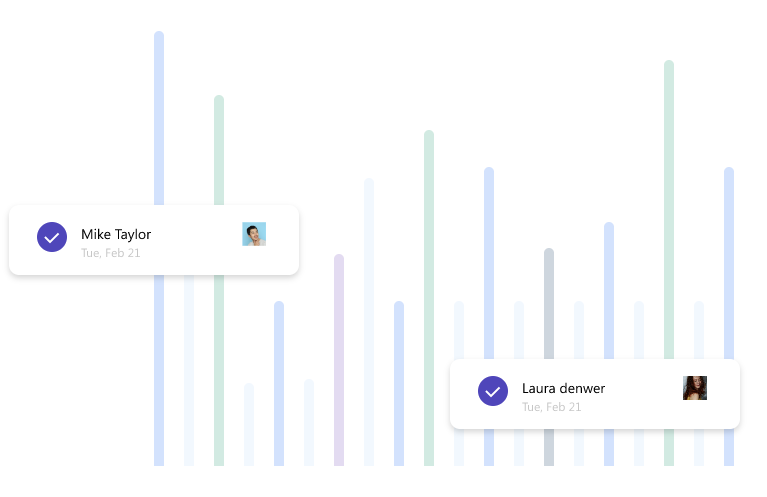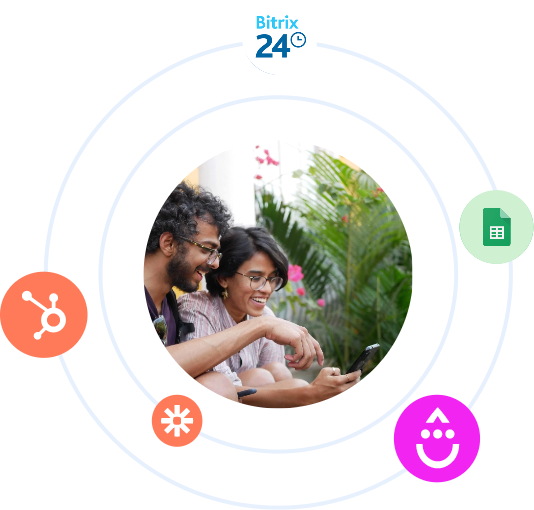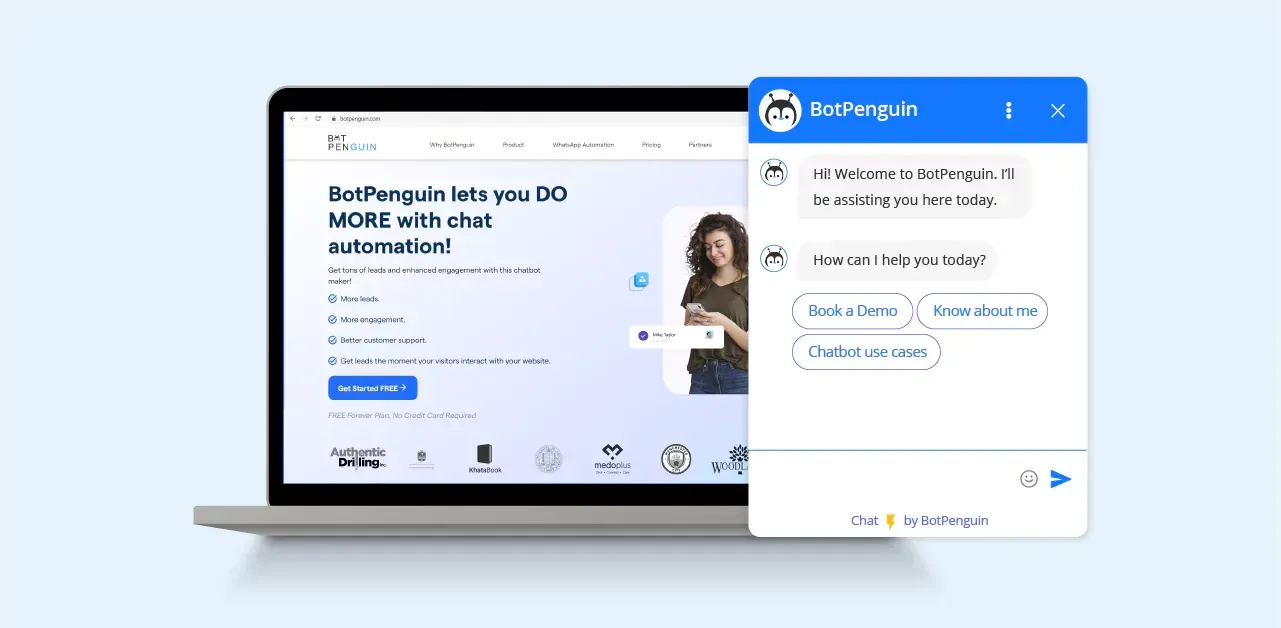WhatsApp is the top choice for businesses to engage in immediate customer communication. With a user base exceeding 2 billion, WhatsApp remains a leading global messenger app, facilitating widespread interactions.
The advent of the WhatsApp Business platform marked a significant milestone by eliminating communication barriers between businesses and customers.
A standout feature of WhatsApp Business API is automation, streamlining repetitive tasks and customer communication processes when integrated with CRM systems or WhatsApp marketing software.
This blog compiles vital information on WhatsApp automation, offering a step-by-step guide for automating customer sales and support conversations using the WhatsApp Business App and WhatsApp API.
Let's see how to initiate and maximize WhatsApp automation for your SaaS business.
Benefits of Automation on WhatsApp for SaaS Business
WhatsApp automation offers a wide range of benefits for SaaS businesses, empowering them to deliver exceptional customer experiences, drive sales, and foster long-term customer relationships.
Let's find these benefits and see how they can transform your business.
Improved Customer Engagement and Support
Effective and prompt customer engagement and support are crucial for the success of any SaaS business. WhatsApp automation provides a powerful solution to deliver personalized responses, improve response times, and efficiently manage customer inquiries.
- Automated Personalized Responses
With WhatsApp automation, you can set up predefined responses to frequently asked questions, ensuring consistent and accurate replies.
By leveraging automated responses, you can provide instant solutions to your customers without manual intervention.
This not only saves time but also enhances customer satisfaction.
- 24/7 Availability and Quick Response Times
WhatsApp automation enables businesses to provide round-the-clock availability to their customers.
Automated chatbots can handle customer queries outside of business hours, ensuring every customer is supervised.
Quick response times build trust and enhance the overall customer experience.
- Efficient Ticket Management
WhatsApp automation streamlines the process of handling customer inquiries and support tickets.
Businesses can prioritize and resolve issues more efficiently by automatically assigning and categorizing incoming messages.
This reduces the burden on support teams and promptly addresses customer queries.
Streamlined Sales and Lead Generation

WhatsApp automation offers exciting opportunities for SaaS businesses to streamline their sales processes and generate high-quality leads.
- Automated Lead Nurturing and Qualification
WhatsApp automation allows businesses to automate lead nurturing and qualification processes.
By sending targeted messages based on user interactions and behaviors, businesses can nurture leads, build relationships, and move them further down the sales funnel.
This automated approach increases efficiency and enables sales teams to focus on closing deals with highly qualified leads.
- Instant Messaging for Sales Conversions
WhatsApp automation enables businesses to connect with potential customers instantly and engage in real-time conversations.
By leveraging automation, businesses can send personalized messages, product information, and offers to prospects, leading to higher sales conversions.
The convenience of instant messaging enhances the customer experience and accelerates the sales process.
- Integration with CRM Systems
Integrating WhatsApp automation with CRM systems allows businesses to effectively capture and manage customer data.
Automated synchronization of customer interactions and conversations helps sales teams gain valuable insights and track the progress of leads.
This integration ensures a seamless flow of information, enabling businesses to provide personalized and targeted offers to customers.
Enhanced User Onboarding and Retention
User onboarding and retention are critical for SaaS businesses to drive product adoption and maintain a loyal customer base. WhatsApp automation can play a significant role in enhancing these processes.
- Automated Onboarding Messages and Tutorials
With WhatsApp automation, businesses can automate onboarding messages and tutorials to guide users through the setup and usage of their products.
By providing step-by-step instructions and tips, businesses can ensure new users have a smooth onboarding experience.
This proactive approach reduces friction, minimizes user churn, and increases product adoption.
- Proactive Customer Success Outreach
WhatsApp automation allows businesses to engage with customers and provide valuable insights and support proactively.
By sending relevant content, tips, and reminders, businesses can establish themselves as trusted advisors and ensure customers get the most out of their products.
Proactive customer success outreach strengthens customer relationships, boosts satisfaction, and improves retention rates.
- In-app Notifications and Updates
WhatsApp automation can deliver in-app notifications and updates to inform users about new features, product enhancements, or important announcements.
Businesses can proactively communicate with their users by leveraging automation, ensuring they stay engaged and updated.
This timely information enhances the overall user experience and promotes long-term product usage.
Suggested Reading:
Getting Started with WhatsApp Automation
WhatsApp automation can revolutionize the way businesses communicate with their customers. Businesses can streamline their processes by leveraging whatsapp automation tools and platforms, enhance customer experiences, and drive growth.
This section will walk you through getting started with WhatsApp automation.
Setting up a WhatsApp Business Account
Before using WhatsApp automation, you need to set up a WhatsApp Business account. This special type of account is designed specifically for businesses and offers additional features and functionalities.
- Registering for a WhatsApp Business Account
Download the WhatsApp Business app from the App Store or Google Play Store to register for a WhatsApp Business account. Once you have installed the app, follow the on-screen instructions to create your account.
- Verifying your business and phone number
After registering, you will need to verify your business and phone number. WhatsApp will send a verification code to the phone number you provided during registration. Enter this code in the app to verify your number.
- Customizing business profile and settings
Once your account is verified, you can customize your business profile and settings. Add important details about your business, such as a profile picture, business description, and contact information. Customizing your profile helps customers recognize and trust your business.
Implementing WhatsApp Automation for SaaS Businesses
WhatsApp automation can greatly benefit SaaS businesses by streamlining customer interactions and improving efficiency.
Let's explore how SaaS businesses can implement WhatsApp automation and reap its rewards.
Integrating WhatsApp Automation with CRM and Helpdesk Systems

Integrating WhatsApp automation with your CRM and helpdesk systems allows for smooth data flow and a unified customer experience.
- Connecting WhatsApp API with CRM platforms
You can automatically sync customer data and conversation history by connecting WhatsApp API with your CRM platform. This ensures your team has a complete view of customer interactions and enables personalized communication.
- Syncing customer data and conversation history
Syncing customer data and conversation history allows you to provide a tailored experience to customers. It lets your team pick up conversations seamlessly and contribute to a meaningful customer journey.
- Tracking and analyzing customer interactions
Tracking and analyzing customer interactions provides valuable insights into customer behavior, preferences, and pain points. This information can be used to optimize your automation workflows and improve customer satisfaction.
Suggested Reading:
Building and Deploying WhatsApp Chatbots
Deploying chatbots on WhatsApp can automate customer support and enhance self-service options.
BotPenguin can be a great option right over here. Check out BotPenguin to know more.
- Defining chatbot objectives and scope
Before building a chatbot, define its objectives and scope. Determine what tasks the chatbot should handle and outline its limitations.
This will help you create a chatbot that meets customer expectations and delivers the desired outcomes.
- Choosing a chatbot development framework
Choose a chatbot development framework that aligns with your business needs and technical capabilities.
Popular frameworks include Dialogflow, Botpress, and Microsoft Bot Framework. Evaluate their features and choose the one that best suits your requirements.
- Training and optimizing chatbot for improved performance
Train your chatbot using relevant datasets and real-life scenarios. Continuously monitor its performance and iterate on its responses to make it more accurate and efficient.
Regularly update your chatbot with new information to ensure that it remains up-to-date.
And taking your first step towards chatbot-enabled WhatsApp automation isn't that tough. Meet Botpenguin, the home of chatbot solutions. It not only provides chatbot for WhatsApp but also caters to the demand of all users by offering chatbot solutions for multiple platforms:
- WhatsApp Chatbot
- Facebook Chatbot
- WordPress Chatbot
- Telegram Chatbot
- Website Chatbot
- Squarespace Chatbot

Testing and Iterating Automation Workflows
Testing and iterating your automation workflows is crucial for delivering a seamless customer experience.
- Creating test scenarios and user flows
Create test scenarios and user flows to ensure your automation workflows work as intended. Simulate different user interactions and evaluate the responses. Identify any issues or bottlenecks and refine your automation processes accordingly.
- Collecting feedback and analyzing results
Gather feedback from clients who have used your automated workflows. Use surveys or feedback forms to collect their thoughts and ideas. Analyze the feedback and discover opportunities for improvement.
- Iterating and improving automation processes
Based on the feedback and analysis, iterate and improve your automation processes. Fine-tune your automated responses, optimize user flows, and eliminate friction points. It's an ongoing process that requires continuous monitoring and refinement.
Conclusion
This WhatsApp Automation tutorial empowers you to engage with customers actively, send personalized messages, and provide swift support.
Looking ahead, the future of WhatsApp Automation is brimming with exciting prospects. Anticipate integrations with AI and chatbots, voice and video messaging automation, advanced analytics and reporting, and updates to the WhatsApp Business API as promising developments.
Botpenguin presents robust WhatsApp automation solutions that streamline customer interactions and elevate business efficiency.
Businesses can establish tailored conversational flows and responses, ensuring round-the-clock support and efficient handling of FAQs.
The chatbot excels at automating order processing, lead generation, and delivering personalized interactions based on user preferences.
Seize the opportunities, adapt to changes, and always seek the right balance between automation and the human touch.
Frequently Asked Questions (FAQs)
What is WhatsApp automation for SaaS businesses, and how does it work?
WhatsApp automation for SaaS businesses involves automated workflows and chatbots to streamline customer interactions. It integrates WhatsApp API with CRM and helpdesk systems to provide personalized and efficient support.
What are the benefits of WhatsApp automation for SaaS businesses?
WhatsApp automation improves customer engagement and satisfaction, streamlines operations, reduces costs and enhances scalability for SaaS businesses. It allows for quicker response times and personalized interactions with customers.
How can CRM integration enhance WhatsApp automation for SaaS businesses?
Integrating WhatsApp automation with CRM systems enables seamless customer data and conversation history syncing. This ensures a holistic view of customer interactions, facilitating personalized communication and efficient workflows.
Is it necessary for SaaS businesses to deploy chatbots on WhatsApp?
Deploying chatbots on WhatsApp is highly beneficial for SaaS businesses. Chatbots automate customer support, address common queries, and provide instant responses, reducing the workload on support teams and improving customer satisfaction.
How can SaaS businesses ensure compliance with WhatsApp policies?
To ensure compliance, SaaS businesses should adhere to WhatsApp's Terms of Service, avoid sending spam or unsolicited messages, and provide easy opt-out options for users. Respecting user privacy and preferences is key to maintaining compliance.


